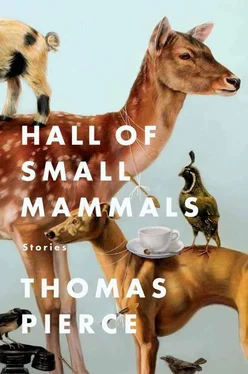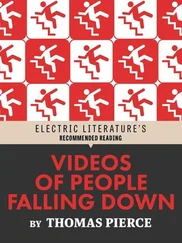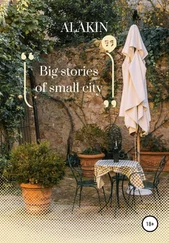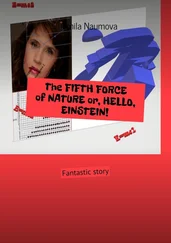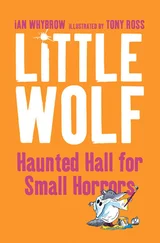“I’m sorry,” she says. “I shouldn’t have let you go out there. That was dumb of me.”
“What are they exactly? What breed?”
“Rottweilers? Dobermans? I don’t know what they are, but they’re freaking huge. Biggest dogs I’ve ever seen. Genetically modified, maybe. Wynn would do that. Order a bunch of genetically modified military dogs. That would be so him. There are two of them, Baba and Bebe. Wait, let me try something. I think I just remembered it.” The dogs are still clawing at the pantry door. She sticks her lips to the crack and says, “Baba Ganoush.” The dogs don’t stop their attack. “Bebe, Baba, Baba O’Riley. It’s something like that.”
“What is?”
“The safe command. Oh, Goosie, I’m sorry I got you into this.”
Goosie. When was the last time she called him that? Back at his townhouse, in the drawer to the right of the stove (his mind still has that power at least, the power to conjure up images, to see things that aren’t directly in front of him), he must have a hundred thank-you cards addressed to Goosie. Thank-yous for the loan, the money that helped Mary buy the soft-serve place that she had, until then, only managed. The golden egg, she called his loan. Him, the goosie.
“The safe command will make them docile,” she says.
“Remind me again who Wynn is to you,” he says.
“A friend,” she says quickly. “He’s out of town for a few days, and I agreed to feed his dogs and bring in the mail. He gave me the safe command before he left. I should have written it down.”
“Could have just told me. I would have remembered.”
She smiles.
“Let’s just call someone for help,” Brooks says.
“I would if I could. My cell is out in the car.”
Brooks fishes around in his pockets.
“Yours is in the car too,” she says.
“Well, that’s bad luck. What should we do now?”
“When they settle back down again, we’ll go together. There’s a door in the kitchen. That’s, what? Like, thirty feet from here?”
Brooks isn’t sure but nods. The dogs are no longer scrabbling at the doors but whining. They walk in circles, with clicking nails, outside. Mary reaches over Brooks’s shoulder for a bag of pistachios. She rips open the plastic at the top and offers him some. “We missed breakfast,” she says.
He doesn’t want any nuts. He sits down on the dog food again, his head back against a shelf. His medication can make him groggy. He needs to rest his eyes.
• • •
If only she had poison. Mary imagines Wynn coming home and finding both dogs dead. She imagines him cradling their bodies and weeping. No, Wynn wouldn’t weep. He’d probably just buy two more dogs, recycle the names, and move on with his life. Mary has never killed an animal as big as a dog. She veered her car in order to hit a squirrel once and regretted it for two days.
She eats another pistachio. She forgot to put out breakfast this morning because her mother called early from Bread Island for an update.
“How’s my boy doing?” she asked.
“He’s still asleep. He made dinner last night for both of us. He dropped an egg, and he freaked a little. But mostly he was fine. Good report from the doctor yesterday.” Mary did her best to repeat the doctor verbatim.
“Did you ask him about the morning headaches?”
“I forgot, I’m sorry. But Brooks hasn’t mentioned them since you left.”
Her mother sighed. “I’m going to cut my trip short,” she said. “I don’t like not being there.”
“Mom, you don’t have to do that, really. We can manage. Are you staying warm?” Mary pictured her mother layered up in animal furs like one of the Arctic explorers of old, posing at a pole, her cheeks red, the fuzzy dark hair on her upper lip frozen, seal blubber on the bottom of her shoes.
“It’s three in the afternoon. We keep the woodstove burning all day, and we’ve got electric heaters too, but Lord, my butt’s been numb ever since I got here. You can take a southerner out of the South but you can’t — well, you understand. The point is, don’t take her out. Just leave her be. But Cora has been great with me here, she really has. This morning she convinced me to visit one of the mining camps with her. She was doing her interviews. I didn’t understand a word of it, of course. All I can do is hold the microphone steady.”
Cora was her mother’s “roommate,” a term they’d used around town for years, with a wink, of course, since they owned separate houses. Cora was a sociologist at the university and had recently won a Fulbright to study the few people who lived on Bread Island, a mostly wild and rocky dot in the ice-cold Baltic Sea. Besides the miners, the only other inhabitants were a small indigenous population that kept to themselves. Mary’s mother, who had never even been outside America before she met Cora five years ago, was on the adventure unofficially as an assistant. Internet access was limited and, because of the time difference, so were phone calls.
“Did you get the pictures I sent?” her mother asked. “Of the frogs?”
Yes, Mary had seen her mother’s photos of the snow frogs, slimy and shimmering on the edge of a half-frozen pond. The frogs, while strange, had been a nice change. Mostly her mother just wrote to complain — about the temperature, about the long days, about all that white, white, white, as far as the eye could see. She said it was like the inside of a crazy person’s head. They found white skeletons in the snow. The wolves ate the musk oxen. The polar bears ate the seals. Everything ate something else. Probably she would be eaten too.
But the frogs, she wrote, were a real inspiration.
“Their eggs are neon-blue in the lake behind our cabin,” her mother said. “The eggs actually glow. It’s amazing. When I’m feeling sad I go down there. Then I remember that everything will probably be all right.”
“Be all right?”
“Didn’t you see my picture of the frogs hugging? Okay, not hugging exactly. The gentleman-frog hitches a ride on the lady-frog’s back, and he fertilizes each egg as it comes out. Cora says they stay that way for months if they go into hibernation together. Romantic, isn’t it?”
Two nasty, clammy frogs squeezing each other for weeks on end in the middle of some frozen field? Romantic was not the first word that hopped into Mary’s mind, not at all, but then again she understood what her mother was getting at, she really did, two otherwise lonely creatures conjoined, clinging to each other, not giving up on each other, swimming into the dark and watery deep, down to the cold, cold bottom of things where nothing else lives. There was, if you disregarded certain details, such as the sex itself, something beautiful about it…
“What’s the matter?” her mother asked. “I can’t tell if you’re crying or if the connection’s gone bad. Are you crying? Did I say something wrong?”
Mary apologized. It was nothing, she said, just something silly. “Stupid boy stuff.”
“Tell me.”
She had kept her mother out of the loop these last few months because of everything that had happened with Brooks. She hadn’t wanted to bother her mother with any of her own troubles. But now that her mother was far away and free, she didn’t mind unloading, at least a little bit. She told her mother about Wynn — about Wynn’s chin, his blue eyes, the perfect gray streak in his long windswept hair, their weekend at the house in Myrtle Beach, and then about his crazy wife, the pediatrician, who was hardly ever around.
Her mother was silent.
“Come on, you can’t judge me. You used to be married ,” Mary said. “To a man .”
“I’m not judging you. And for the record, I wasn’t married when I met Cora. In case you’ve forgotten, I was alone for almost eight years after your—”
Читать дальше
